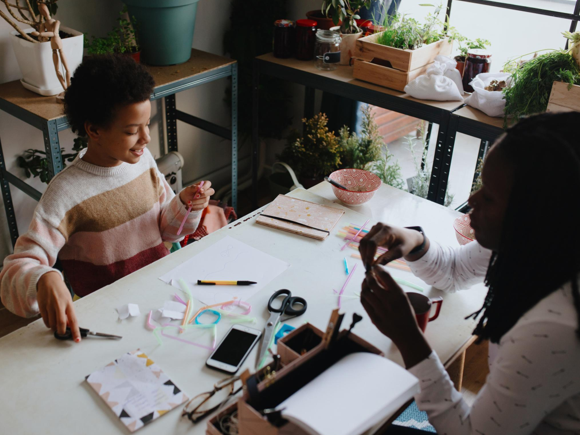The COVID-19 pandemic has upturned family life around the world. The fact that schools and businesses were forced to shut down to flatten the curve of the virus spread has forced parents who also have to work remotely for this same reason to be locked down with their kids who would otherwise be in school at this time. This sudden disruption to our daily routine is a lot to navigate for anyone, but especially for parents who now have to work from home with the distractions engendered from having the kids around while trying to get serious work done.
Social media has been agog with tales of parents reporting the mischiefs of their wards and the accompanying distractions. While these tales are often told in humour and as a form of entertainment, the truth remains that being locked down with kids while working is still a herculean task.
Hard as it may seem, lockdown with kids is not all bad and stressful tales as it affords parents a chance to make better relationships with their children and teenagers, which in turn makes children feel loved and secure, and shows them that they are important.
Amazons Watch magazine as part of its mandate of finding solutions to issues that affect women has carried out extensive research to bring parents and caregivers a set of handy tips to help manage this new (temporary) normal. The tips contained in this article have been gathered from personal experiences based on a social media survey, UNICEF, and Parent24.com.
- Talk about COVID-19 with your kids
I was on the phone with a friend a week ago and asked to say hello to her kids aged 6 and 8. In my chit chat with them, I playfully asked why they were not in school as it was a weekday. I was impressed when the 6-year-old articulately explained the coronavirus, the mode of transmission and how being at school at this time will pose a risk for them and their friends at school. I was very impressed and commended my friend who explained that she took time out to explain why they were staying at home to them. I decided to start a social experiment, by asking kids of friends and relatives in the same age bracket why they were staying at home at this time. And must give a big thumbs up to parents of the kids I spoke with as about 70% clearly understood while they are homeschooling at the moment. My social experiment also revealed something else. Parents of the 30% who did not understand why they were being forced to stay at home at this time, reported more anxiety, stress and general difficulties in dealing with the tantrums engendered by being at home with kids and trying to work at home. Could there be a connection?
Talking about the pandemic with your children will not necessarily scare them as the parents in the 30% of my social experiment gave as an excuse for not discussing this with their kids. Parents should have honest conversations with their kids as silence and secrets do not protect children as honesty and openness do.
In talking about the pandemic though, we should be supportive and observe age-appropriate information. The kids might already be scared or confused, so allow them time to express how they feel and offer comfort.
Also, note that it is very okay not to have all the answers. Do not try to be superheroes to your kids and mislead them. It is fine to say “We don’t know, but we are working on it, or we don’t know, but we think.” Use this as an opportunity to learn something new with your child!
- Have One-on-one time with the kids
School shutdown also affords parents a chance to make better relationships with children and teenagers. One-on-One time is free and fun. It makes children feel loved and secure and shows them that they are important.
If you have more than one kid, can you set aside time to spend with each child on an individual basis? It can be for just 20 minutes, or longer, and you can choose the same time each day so children or teenagers can look forward to it, or as flexible as your own work schedule permits. It will be very productive to ask each child what they will like to do with their one-on-one time with mummy. Allowing them to choose builds their self-confidence. However, If they want to do something that isn’t okay with physical distancing, then this is a chance to talk with them about this.
Things to do with toddlers could include; copying their facial expressions and sounds, singing or making music with pots and spoons, stack cups or blocks, tell a story, read a book or share a picture. For young children, things to do might include; reading a book or looking at pictures, make drawings with crayons or pencils, dance to music or sing songs, do a chore like cleaning or cooking together, and help with school work. For teenagers, discuss something they like. It could be sports, music, celebrities or even their friends. You can also cook a favourite meal or share a recipe with your teenager. Exercising or dancing together is also very beneficial.
- Stop the yelling and try keeping it positive
It is hard to feel positive when our kids or teenagers are driving us crazy. We often end up saying “Stop doing that!”. But children are much more likely to do what we ask if we give them positive instructions and lots of praise for what they do right. Make a conscious effort to use positive words when telling your child what to do; like “Please put your clothes away” instead of saying “Don’t make a mess”. The way we deliver instructions is very important. Shouting at your child will just make you and them more stressed and angrier. Instead, get your child’s attention by using their name and try speaking in a calm voice.
This is not a period to be conservative with praise, rather try showering kids with it. When you praise your child or teenager for something they have done well, they may not show it, but you’ll see them doing that good thing again and also reassures them that you notice and care.
Also, try to get really real. For instance, can your child actually do what you are asking them? It is very hard for a child to keep quiet inside for a whole day, but maybe they can keep quiet for 15 minutes while you are on a call.
Staying connected is also very important, especially for teenagers. Can you help them stay connected with their friends? Help your teen connect through social media and other safe, distancing ways. This is something you can do together, too!
- Get Structured
COVID-19 has taken away our daily work, home and school routines. This is not only hard for you, but also for children and teenagers. Making new routines can help everyone cope better. You can try creating a flexible but consistent daily routine if your own work schedule permits that. Make a schedule for you and your children that has time for structured activities as well as free time. Doing this can help children feel more secure and better behaved. Children or teenagers can help plan the routine for the day – like making a school timetable. Children will follow this better if they help to make it.
Make sure to Include exercise in each day’s routine as this helps with stress.
Make sure to use part of the structured time to teach your child about keeping safe distances and if it is okay in your country, get children outside. You can also write letters and draw pictures to share with people. Put them up outside your home for others to see! You can reassure your child by talking about how you are keeping safe. Listen to their suggestions and take them seriously.
- Keep your children safe online during COVID-19
Children and teens are now spending a lot more time online. Being connected helps them reduce the impact of COVID-19 and encourages them to continue with their lives…but it also presents risks and dangers. The risks include; adults targeting children for sexual purposes on social media, gaming, and messaging platforms.
Harmful content – violence, misogyny, xenophobia, inciting suicide and self-harm, misinformation, etc. We have teens sharing personal information and sexual photos or videos of themselves, as well as cyberbullying from peers and strangers.
Some tech fixes to deal with these risks might include;
Setting up parental control, turning on Safe Search on your browser, setting up strict privacy settings on online apps and games, covering webcams when not in use, etc.
- Family Harmony at Home
When we model peaceful and loving relationships, our children feel more secure and loved. Positive language, active listening and empathy help maintain a peaceful and happy family environment during these stressful times. We should always remember that we are models for our kids, hence how we talk and behave in front of others is a big influence on how they behave too!
We should practice talking kindly to everyone in the family, be it, adults or children, as bad communication between adults in the household can have a negative impact on our children. The more we practice modelling peaceful, loving relationships for our children, the more secure and loved they will feel. It is inevitable that we will still feel stressed or angry sometimes during this lockdown. When this happens, give yourself a 10-second pause and breathe in and out slowly five times. Then try to respond in a calmer way. Millions of parents say this helps – A LOT!
Call a truce when you can see arguments building up, and go into another room or outside if you can.
We all pray for this pandemic t quickly pass so we can have our normal lives and routines back. While we positively look forward to that happening, these tips can help parents, especially mothers, to cope with the stress of being locked down with kids.
Kembet Bolton





Comments are closed.